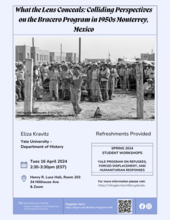During the Bracero Program (1942–1964), the U.S. and Mexican governments collaborated to facilitate the temporary labor migration of millions of Mexican farmworkers to the U.S. Originally created to fill U.S. wartime agricultural needs, the Program continued after the culmination of World War II through bilateral agreements that institutionalized and scaled up the infrastructure of bracero migration. This large-scale movement of migrants left lasting legacies on agriculture and migration in the U.S., as well as on rural economic livelihoods, cultures of migration, and patterns of development in Mexico.
Although the Program boasts a rich archive and historiography, one aspect that has remained relatively unexplored is the bracero contracting process in the Mexican interior. Seeking to address that gap, Eliza Kravitz interrogates the diverse meanings ascribed to the Bracero Program in 1950s Monterrey, Nuevo León, an industrialized city in northern Mexico that hosted a prominent bracero contracting center. As a key site of encounter between rural and urban dwellers, northern and southern Mexicans, and everyday citizens and the U.S. and Mexican governments, the Monterrey contracting center generated varied ideas about braceros’ identities and motives, the selection process, and the Bracero Program as a whole. Using a rich archive from varied local perspectives, Kravitz’s research reveals not only the humanitarian and local community struggles that emerged from the Monterrey contracting center, but also the ways in which local actors linked the Bracero Program to broader issues of rural disinvestment, the legacies of the Mexican Revolution, and mid-century Mexican politics at all levels, from the individual to the nation. Kravitz highlights points of contradiction and commonality among local actors, with import for historical understandings of the Program’s many contested meanings and the ideologies underlying its termination.
Eliza Kravitz is a senior at Yale University majoring in History and completing certificates in Spanish and Human Rights. She is interested in pursuing legal and historical work related to Latin American migration, and she has spent the past two summers working in legal and humanitarian aid near the Texas-Mexico border. On campus, she sings with the Yale Glee Club, interprets for Spanish-speaking immigration cases at New Haven Legal Assistance Association, and prepares taxes for low-income New Haven residents with Volunteer Income Tax Assistance.

